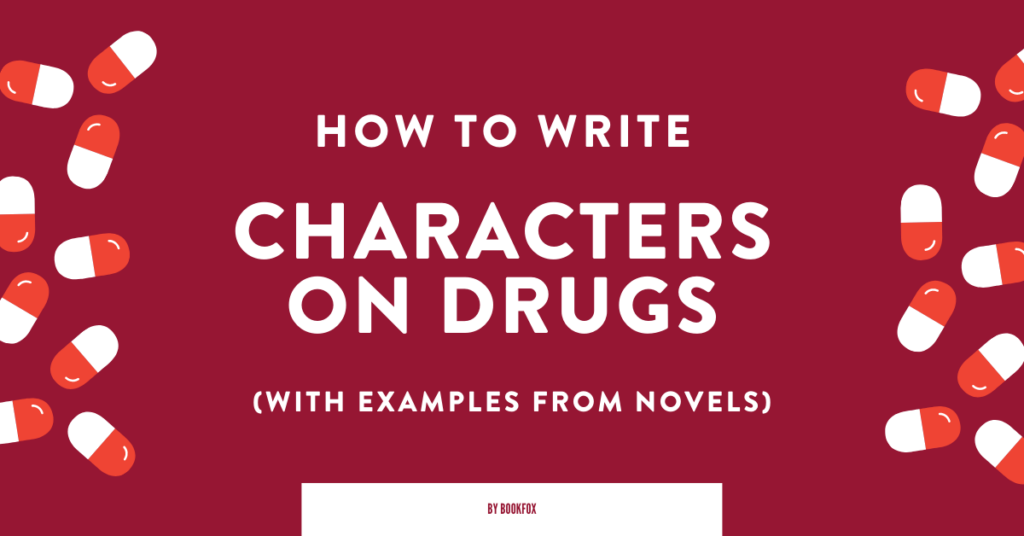
When one of your characters is on drugs, you want to accurately portray the thoughts, actions, and speech of what someone would say on such a drug.
But some of you might not want to take Ecstasy or Cocaine or Toad Venom in the course of your casual “writing research.”
This post will rescue you!
Read all these examples from literature about how other writers described the state of mind and actions of their characters when on particular drugs.
And it doesn’t matter whether you’re writing in first person or in third. First person is more immediate, but as you can see from the examples below, third person can reflect an addled state just as intimately.
My favorite examples and excerpts below veer close to poetry. That’s because they’re attempting to describe something at the limits of consciousness, where a mind breaks through the typical boundaries.
Writers, please read and learn from the passages below.
These are the drugs covered in this post:
- LSD
- Ecstasy
- Mescaline
- Marijuana
- Heroin
- Cocaine
- OxyContin
- Opium
- Ayahuasca
- Amphetamines
- Hashish
- Toad Venom
- Glue
- Fictional Drugs
- Withdrawal Sensations
1. LSD
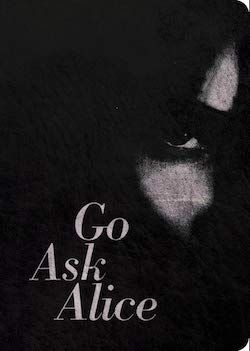
“Go Ask Alice” by Anonymous
Alice drinks a bottle of Coke at a party, and someone has spiked 10 out of the 14 of them with LSD. So she goes on this trip unwillingly, but really enjoys it.
My whole body was tense at every muscle and a feeling of weird apprehension swept over me, strangled me, suffocated me. When I opened my eyes, I realized that it was just Bill who had put his arm around my shoulder. ”Lucky you”, he was saying in a slow-motioned record on the wrong speed voice, ”but don’t worry, I’ll baby-sit you. This will be a good trip. Come on, relax, enjoy it.” He caressed my face and neck tenderly, and said, “Honestly, I won’t let anything bad happen to you.” Suddenly he seemed to be repeating himself over and over like a slow-motioned echo chamber. I started laughing, wildly hysterically. It struck me as the funniest, most absurd thing I had ever heard. Then I noticed the strange shifting patterns on the ceiling. Bill pulled me down and my head rested in his lap as I watched the pattern change to swirling colours, great fields of reds, blues and yellows. I tried to share the beauty with the others, but my words came out soggy, wet and dripping or tasting of colour. I pulled myself up and began walking, feeling a slight chill which crept inside as well as outside my body. I wanted to tell Bill, but all I could do was laugh.
Soon whole trains of thought started to appear between each word. I had found the perfect and true and original language, used by Adam and Eve, but when I tried to explain, the words I used had little to do with my thinking. I was losing it, it was slipping out of my grasp, this wonderful and priceless and true thing which must be saved for posterity. I felt terrible and finally I couldn’t talk at all and slumped back onto the floor, closed my eyes and the music began to absorb me physically. I could smell it and touch it and feel it as well hear it. Never had anything ever been so beautiful. It was a part of every single instrument, literally a part. Each note had a character, shape and colour all its very rest of the score so that I could consider its relationship to the whole composition, before the net note sounded. My mind possessed the wisdom of the ages and there were no words adequate to describe them.
I looked at a magazine on the table, and I could see it in 100 dimensions. It was so beautiful I could not stand the sight of it and closed my eyes. Immediately I was floating into another sphere, another world, another state. Things rushed away from me and at me, taking my breath away like a drop in a fast elevator. I couldn’t tell what was real and what was unreal. Was I the table or the book or the music, or was I part of all of them, but it didn’t really matter, for whatever I was, I was wonderful.
My senses were so up that I could hear someone breathing in the house next door and I could smell someone miles away making orange and red and green ribbed Jell-o.
Four easy takeaways that writers can learn from this passage:
- We have finding unfunny things funny
- We have visions of geometric colors and shapes
- Heightened senses
- Euphoria about language, but brain too dysfunctional to put it into language
2. LSD
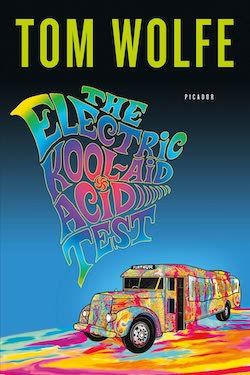
“The Electric Kool-Aid Acid Test” by Tom Wolfe
The whole other world that LSD opened your mind to existed only in the moment itself—Now—and any attempt to plan, compose, orchestrate, write a script, only locked you out of the moment, back in the world of conditioning and training where the brain was a reducing valve.
So they would try still wilder improvisations … like the Human Tapes, huge rolls of butcher paper stretched out on the floor. They would take wax pencils, different colors, and scrawl out symbols for each other to improvise on: Sandy the pink drum strokes there, and he would make a sound like chee-oonh-chunh, chee-oonh-chunh, and so forth, and Kesey the guitar arrows there, broinga broinga brang brang, and Jane Burton the bursts of scat vocals there, and Bob Stone the Voice Over stories to the background of the Human Jazz—all of it recorded on the tape recorder—and then all soaring on—what?—acid, peyote, morning-glory seeds, which were very hell to choke down, billions of bilious seeds mulching out into sodden dandelions in your belly, bloated—but soaring!—or IT-290, or dexedrine, benzedrine, methedrine— Speed!—or speed and grass—sometimes you could take a combination of speed and grass and prop that… LSD door open in the mind without going through the whole uncontrollable tumult of the LSD … And Sandy takes LSD and the lime :::::: light :::::: and the magical bower turns into… neon dust… pointillist particles for sure, now. Golden particles, brilliant forest-green particles, each one picking up the light, and all shimmering and flowing like an electronic mosaic, pure California neon dust. There is no way to describe how beautiful this discovery is, to actually see the atmosphere you have lived in for years for the first time and to feel that it is inside of you, too, flowing up from the heart, the torso, into the brain, an electric fountain … And … IT-290!—he and George Walker are up in the big tree in front of the house, straddling a limb, and he experiences .. . intersubjectivity—he knows precisely what Walker is thinking.
3. LSD (Acid)
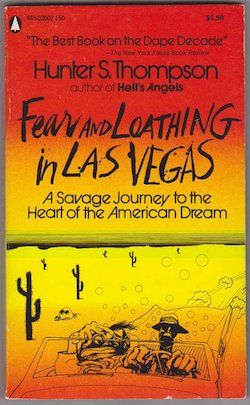
There are any number of drugs that could serve as an example in Hunter S. Thompson’s “Fear and Loathing in Las Vegas,” but let’s start with acid.
The woman never blinked. “Your room’s not ready yet,” she said. “But there’s somebody looking for you.”
“No!” I shouted. “Why? We haven’t done anything yet!” My legs felt rubbery. I gripped the desk and sagged toward her as she held out the envelope, but I refused to accept it. The woman’s face was changing: swelling, pulsing… horrible green jowls and fangs jutting out, the face of a Moray Eel! Deadly poison! I lunged backwards into my attorney, who gripped my arm as he reached out to take the note. “I’ll handle this,” he said to the Moray woman.
“This man has a bad heart, but I have plenty of medicine. My name is Doctor Gonzo. Prepare our suite at once. We’ll be in the bar.”
The woman shrugged as he led me away. In a town full of bedrock crazies, nobody even notices an acid freak.
We struggled through the crowded lobby and found two stools at the bar. My attorney ordered two cuba libres with beer and mescal on the side, then he opened the envelope. “Who’s Lacerda?” he asked. “He’s waiting for us in a room on the twelfth floor.”
I couldn’t remember. Lacerda? The name rang a bell, but I couldn’t concentrate. Terrible things were happening all around us. Right next to me a huge reptile was gnawing on a woman’s neck, the carpet was a blood – soaked sponge – impossible to walk on it, no footing at all. “Order some golf shoes,” I whispered. “Otherwise, we’ll never get out of this place alive. You notice these lizards don’t have any trouble moving around in this muck – that’s because they have claws on their feet.”
So with acid, you skip all the poetic and go straight for the impossible. These hallucinations are simply presented as real, and yet the reader knows that a huge reptile cannot be eating a woman in line when she’s checking into casino.
If you wanted to know how to write altered states of conscious, Fear and Loathing should probably be the first book you pick up. There’s mescaline, acid, cocaine, ether, amyls, and just about any other drug you can think of, and they mix all of it together.
4. Ecstasy
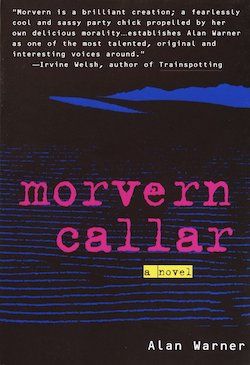
There’s a reason that Ecstasy is called a club drug. E, or Molly as some call it, heightens the sensations and gives its users a euphoria (although make sure to drink plenty of water!).
“Morvern Callar” by Alan Warner
A dreamy repeating pulse began. Immersed in the darkness, feet kept on the floor by the water bottle, bottom half followed the pulse and drone. Sometimes torso and arms were everything else: the bleepers or synth patterns; sometimes I stretched up fingers-my keys banging, banging against collarbone. My hair was slapping about, it got so sodden with sweatness and the mineral water I’d tip over it every now and again.
The way Sacaea was doing it the music was just a huge journey in that darkness. When we needed brought down to rest the ambient let us relax then he slowly built us up until we were back in hardcore again and he pushed the ‘core as long as I could take it before much softer synth waves were beaming across us. I’d lost my water bottle. Stretching up fingers to touch the ever-so-occasional laser needles you could feel how high up your legs the skirt might be with the pounding, pounding of hardcore all round you.
I was so close some boy or girl that their sweat was hitting me when they flicked arms or neck to a new rhythm. I slid my foot to the left. You felt the whole side of a face lay against my bare back, between shoulder blades. It was still part of our dance. If the movement wasnt in rhythm it would have changed the meaning of the face sticking there in the sweat. You didnt really have your body as your own, it was part of the dance, the music, the rave. The face moved away then fingers touched my neck and I put my fingers on the cheeks to feel its maleness: bit beard. I leaned forward for the cuddle, our lower halves were still moving fast to the rhythm. No judgement: he couldnt know who I was. I wouldn’t know him. I took the kiss, my finger touched his wet curl of hair, like a monocle hanging behind his ear. Having to do this position to keep the kiss we stepped back and a flashing arm caught my ear. The softness of wet bosom pressed my elbow so I threw an arm round a girl and the three of us danced in a link till the repeating pulse slowed and I turned my head to kiss the male mouth all the deeper.
5. Ecstasy
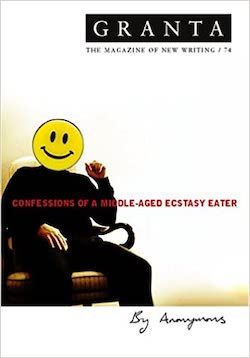
“Confessions of a Middle-Aged Ecstasy Eater” by Anonymous
Ecstasy is delicious. Or, put it another way, Ecstasy is delicious and I recommend highly, loudly and long that everyone whose health does not contraindicate or preclude its ingestion, ought to ingest it. Go out, I admonish you, all of you, hit the streets or collar that neighbourhood kid, drum up a contact, do a deal, repair thyselves home, soften the lights, put on some music – the best stuff – pour yourself a pitcher of ice water, perhaps two, keep a tin of Altoids handy, as well as a tube of Vicks inhalant and a couple of packs of mineral ice, make yourself comfortable, lie back and… swallow. An hour from now, perhaps less, you are going to experience something that shall forever change such time as remains to you on this earth. You are going to experience something that is, every second of it, delicious – deliciously, positively, unprecedentedly w-o-n-d-e-r-f-u-l.
It is your self-anointing, and I envy you that first time. So relish it, savour it, languish it, treasure it, that sacred four hours. You have just swallowed wonder, ambrosia and mead, you have partaken of lustre and grace. Just make certain that before you swallow you know that the pill is authentic, and not some rip-off. Do that, and the rest is a piece of cake, a piece of cake that is like no other you have ever tasted. Think of the best day of your life, or recall the sweetest, purest, most special thing along the way – person, place, moment, experience, accomplishment. Now multiply that tenfold. That does not begin to describe how impossibly delicious E is.
6. Mescaline
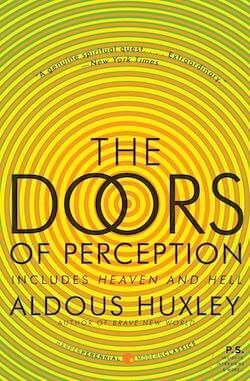
In “The Doors of Perception,” by Aldous Huxley, he experiments with Mescaline. This served as the real life experience that he used for the fictional drug “Soma” when he wrote “Brave New World.”
Mescaline is the active ingredient in peyote, which was used by Native Americans to achieve hallucinogenic trips.
I took my pill at eleven. An hour and a half later, I was sitting in my study, looking intently at a small glass vase. The vase contained only three flowers…I was not looking now at an unusual flower arrangement. I was seeing what Adam had seen on the morning of his creation—the miracle, moment by moment, of naked existence.
I was looking at my furniture, not as the utilitarian who has to sit on chairs, to write at desks and tables, and not as the cameraman or scientific recorder, but as the pure aesthete whose concern is only with forms and their relationships within the field of vision or the picture space. But as I looked, this purely aesthetic, Cubist’s-eye view gave place to what I can only describe as the sacramental vision of reality. I was back where I had been when I was looking at the flowers-back in a world where everything shone with the Inner Light, and was infinite in its significance. The legs, for example, of that chair–how miraculous their tubularity, how supernatural their polished smoothness! I spent several minutes–or was it several centuries?–not merely gazing at those bamboo legs, but actually being them…
I saw the books, but was not at all concerned with their positions in space. What I noticed, what impressed itself upon my mind was the fact that all of them glowed with living light and that in some the glory was more manifest than in others. In this context position and the three dimensions were beside the point. Not, of course, that the category of space had been abolished. When I got up and walked about, I could do so quite normally, without misjudging the whereabouts of objects. Space was still there; but it had lost its predominance. The mind was primarily concerned, not with measures and locations, but with being and meaning.
Once again we have the sense of self displaced. He is not observing bamboo legs, he becomes the bamboo chair legs.
And both the books and furnature glows with an inner light, as if he’s able to see past their thingness and to some core, inner reality.
7. Mescaline
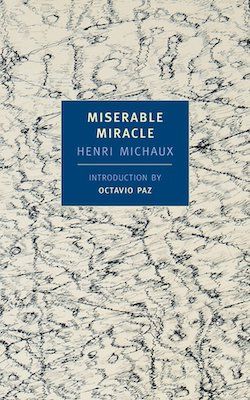
“Miserable Miracle,” Henri Michaux
Aldous Huxley makes a drug trip seem orderly. He gives shape and logic to it. He clarifies what everything means.
Henri Michaux, on the other hand, writes a drug trip how it feels. It seems as though he writes it while still on the trip. It’s difficult to understand from the outside, a wholly surreal experience. Clarity is never the goal, but rather the goal is the accurate representation of perception:
I should like. I should like—whatever, and fast. I should like to leave. I should like to be rid of all this I should like to start from zero. I should like to get out of here. Not to go out through an exit. I should like a multiple exit, shaped like a fan. An exit that never ends, an ideal exit, an exit such that having gone out I should immediately start to go out again.
I should like to get up. No I’d like to lie down, no I’d like to get up immediately, no I’d like to lie down at once, I want to get up, I am going to telephone, no I am not going to telephone. But I really must. No, I definitely won’t telephone. Yes, I will telephone. No, I am going to lie down.
After reading that, you might feel like you are on drugs. Or perhaps you wish to be, because those were a twisty-turny screwed up set of paragraphs.
8. Marijuana
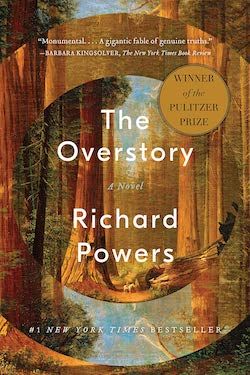
In “The Overstory” by Richard Powers, we have a woman listening to music after smoking a joint.
The music pelts her deltoids and takes her brain out for a lazy adult swim. Spiders set up a colony under her skin. When she places a palm on her thigh, the push of it keeps gliding all the way out to the idea horizon. Soon the beautiful brainstorms come, the ones that link up in front of her eyes and make the whole mess of human history so lovely and self-evident. The universe is big, and she’s allowed to fly around through the nearby galaxies for a while, zapping things for fun, if she doesn’t abuse her powers or hurt anyone. She does so love this ride.
Then the tunes start up, the inner ones. She shuts off the disc player and tries to figure out how to cross the ocean of room. When she stands, her head keeps rising, straight up, into a whole new layer of being. Her laugh propels her, helps her balance, and she sails off across the floorboards, her tits glowing like precious pearls. After a while, she gets to where she was going and holds still for a minute, trying to recall why she needed to get there. Hard to hear anything, over the magic melodies of her own devising.
A little loopy, and once again we have the space theme, with the galaxies – it’s probably the most frequent commonality between all these drug experiences.
She also forgets why she was walking across the rose, and has a floating sensation. She’s also supremely confident that she understands the mess of human history—that overconfidence is a hallmark of pot.
9. Green (uncured) Marijuana
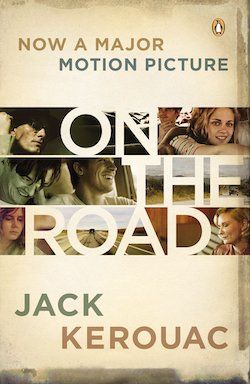
“On the Road” by Jack Keroac
What I like about this drug use description is that it’s after the fact, someone looking back and describing their experience over three days. So we’re not immersed in the mind of a drug user, as much as looking at the experience of one from the outside.
And it’s also great that this character gets three distinct experiences from smoking pot, each split across a new day:
- Beauty
- Epiphanies
- Nightmares
“The first day,” he said, “I lay rigid as a board in bed and couldn’t move or say a word; I just looked straight up with my eyes open wide. I could hear buzzing in my head and saw all kinds of wonderful technicolor visions and felt wonderful. The second day everything came to me, EVERYTHING I’d even done or known or read or heard of or conjectured came to me and rearranged itself in my mind in a brand-new logical way and because I could think of nothing else in the interior concerns of holding and catering to the amazement and gratitude I felt, I kept saying, ‘Yes, yes, yes, yes.’ Not loud. ‘Yes,’ real quiet, and these green tea visions lasted until the third day. I had understood everything by then, my life was decided, I knew I loved Marylou, I knew I had to find my father wherever he is and save him, I knew you were my buddy et cetera, I knew how great Carlo is. I knew a thousand things about everybody everywhere. Then the third day began having a terrible series of waking nightmares, and they were so absolutely horrible and grisly and green that I lay there doubled up with my hands around my knees, saying, ‘Oh, oh, oh, ah, oh . . .’ The neighbors heard me and sent for a doctor. Camille was away with the baby, visiting her folks. The whole neighborhood was concerned. They came in and found me lying on the bed with my arms stretched out forever. Sal, I ran to Marylou with some of that tea. And do you know that the same thing happened to that dumb little box?—the same visions, the same logic, the same final decision about everything, the view of all truths in one painful lump leading to nightmares and pain—ack!
10. Marijuana
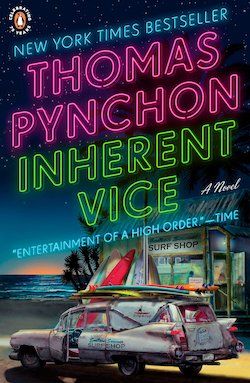
“Inherent Vice” by Thomas Pynchon
Sometimes in the shadows the view would light up, usually when Doc was smoking weed, as if the contrast knob of Creation had been messed with just enough to give everything an underglow, a luminous edge, and promise that the night was about to turn epic somehow … The dope was some Hawaiian product Doc had been saving, although at the moment he couldn’t remember for what. He lit up. About the time he was ready to transfer the roach to a roach clip, the phone rang again, and he had one of those brief lapses where you forget how to pick up the receiver.
Asian indica, heavily aromatic. Doc prepared to be knocked on his ass but instead found a perimeter of clarity not too hard to stay inside of. The glow at the end of the joint was blurred by the fog, and its color kept shifting between orange and an intense pink. Doc peered at Coy’s intermittently distinct face, the drops of fog condensed on his beard shining in the lights from the Club Asiatique, a million separate little hallows radiating all the colors of the spectrum.
Doc inhaled and considered. This same Nixonface here, live on the screen, had somehow already been put into circulation, months ago, on millions, maybe billions, in false currency … How could this be? Unless … sure, time travel of course … some CIA engraver, in some top-security workshop far away, was busy right now copying this image off of his own screen and then would later somehow go slip this copy into a covert special mailbox, which would have to be located close to a power-company substation so they could bootleg the power they needed, raising everybody else’s rates, to send information time-traveling back into the past, in fact there might even be time-warp insurance you could buy in case these messages went astray among the unknown energy surges out there in the vastness of Time …
- The first two paragraphs focus on the visual changes from smoking pot: The colors of the spectrum, the underglow of creation.
- Also, there’s some forgetfulness, of how to pick up a phone, of what he was saving the roach for.
- The last paragraph is indicative of the mental state of being high: the paranoid rambling connections where no connections exist, the non-epiphany epiphanies that sound downright stupid to a sober individual.
11. Heroin
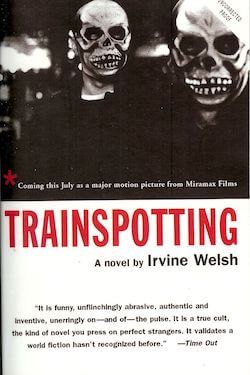
In “Trainspotting” by Irvine Welsh, all the young characters are heroin addicts.
“I went to take a shot. It took us ages to find a vein. My boys don’t live as close to the surface as most people’s. When it came, I savoured the hit. Ali was right. Take your best orgasm, multiply the feeling by twenty, and you’re still fuckin miles off the pace. My dry, cracking bones are soothed and liquefied by ma beautiful heroine’s tender caresses. The earth moved, and it’s still moving.”
12. Heroin
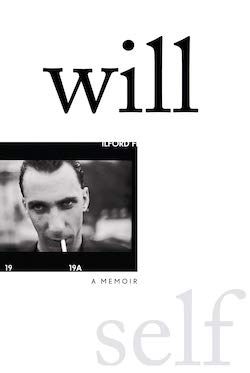
“Will” by Will Self
This book is written in the third person, but Will Self has said that it’s a fair representation of his own addiction to heroin.
Yes – oscillating furiously on the spot, havering between the judgement of Nathaniel and that of Dennis, all the while the plastic leech of the syringe resting in the crook of his arm. Oscillating furiously, and, as he’d pressed the plunger home a touch more … and more, he’d heart it: Waaaste nooot, waaant nooot! Her hokey homily whooshing into and out of the inner ears, while the blackness welled up at the periphery of his vision, and his bebop heart began to play arrhythmic drum fills and hit rim-shots on his resonating ribcage. He’d waited, acutely conscious that, were he simply to press his thumb right home, it’d be a cartoonish death: That’s all folks! As the aperture screwed shut forever.
Instead, he’d completed the figure-eight circuit again and again – his vision darkening again annagain … until at last the aperture screwed fully open on the reflection of his own troubling face.
Which was why, instead of identifying prospects for IBM’s salesmen, he’d pitched, head-first againannagain, into that plush inner-space of … mothball-scented fur coats. There he’d floated, free from all cares and woes, until an irate voice yanked him back into the real world of chicken-salad on seeded baps and vending-machine tea.
But will isn’t a good chap – not this morning: this morning he’s a protoplasmic blob … barely held together by the junk remaining in his system. Heroin slooows everythiiing dooown: the intestines’ peristalsis becomes glacial, saliva evaporates, the cock stops, while mucus hardens … cellophane crinkling up in the nose.
13. Heroin
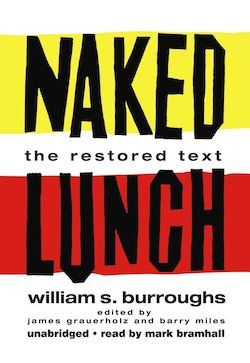
William S. Burroughs, “Naked Lunch.”
“We stock up on H and backtrack for Mexico. Back through Lake Charles and the dead slot-machine country, south end of Texas, n*****-killing sheriffs look us over and check the car papers. Something falls off you when you cross the border into Mexico, and suddenly the landscape hits you straight with nothing between you and it, desert and mountains and vultures; little wheeling specks and others so close you can hear wings cut the air (a dry husking sound), and when they spot something they pour out of the blue sky, that shattering bloody blue sky of Mexico, down in a black funnel …
14. Heroin (Dope)
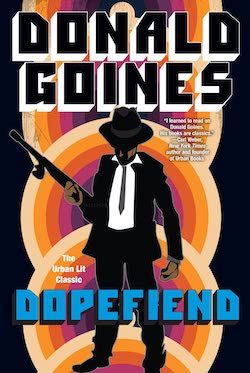
Donald Goines, “Dopefiend”
Tearing a small piece off the cover, she made a small shovel and began to snort the dop from the album cover. She frowned when the bitter taste filled her throat, but she continued putting the stuff in her nose. The strong drug began to take effect almost immediately … Terry could feel herself drifting off. It was as if she were in a fog, yet she was aware of her surroundings. She noticed Porky staring at her, and she tried to pull herself together. The drug was too powerful, or rather, gave her an attitude of indifference. “The hell with it,” she reasoned, and drifted off into a nod, as her head slowly dropped down on her chest.
15. Cocaine
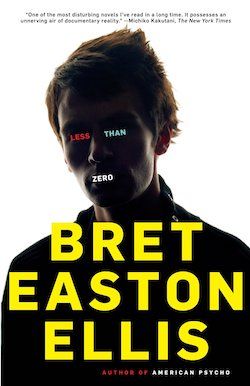
“Less Than Zero” by Bret Easton Ellis.
It begins to rain in L.A. I read about the houses falling, slipping down the hills in the middle of the night and I stay up all night, usually wired on coke, until early morning to make sure nothing happens to our house. I lie on the bed, awake, take twenty milligrams of Valium to come off the coke, but it doesn’t get me to sleep. I turn MTV off and the radio on, but KNAC won’t come in so I turn the radio off and stare out across the Valley and look at the canvas of neon and fluorescent lights lying beneath the purple night sky and I stand there, nude, by the window, watching the clouds pass and then I lie on my bed and try to remember how many days I’ve been home and then I get up and pace the room and light another cigarette and then the phone will ring. This is how the nights are when it rains.
16. Crack Cocaine
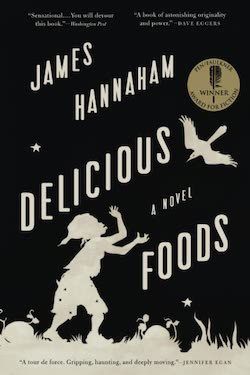
In James Hannaham’s “Delicious Foods,” crack cocaine isn’t just used—it’s actually a narrator in some chapters! Here we see Darlene taking hits of crack from a pipe on a bus:
Jackpot! One the brothers passed the pipe up front and Darlene sucked it like it’s a pacifier.
This is an incredible opportunity, Darlene gushed. She felt like Miss America taking her first walk with that motherfucking tiara on, carrying them roses in her arms and waving and crying. A screen rolled down over her world that showed a sparkling future of joy, just like the book told her she gonna get by asking and believing that she gonna receive. She goes, Drugs are good, and she threw a smile as easy as you’d throw a 45 onto a turntable back in the day.
And in this excerpt, a character named Darlene changes in two ways one she takes some hits from a crack cocaine pipe:
- She becomes very talky
- She becomes much more optimistic, almost euphoric
17. OxyContin
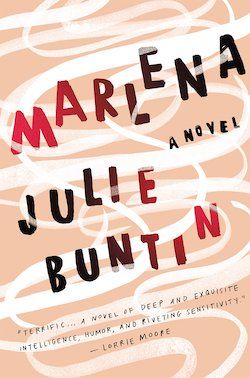
“Marlena” by Julie Buntin
They were small and yellow or small and white and could be dissolved under the tongue. They were bright orange and made you shit, or they were oblong and snowy and blocked you up for days. They came out of Marlena’s pin, one and two at a time, or from an unlabeled tube in her tote bag, all mixed together … She kept careful track of her pills. In her palm, they were all different colors and sizes and they were tiny doorways, expanding the options of the place where we lived by a millionfold. They were called Oxys and benzos and Addys and Xany Bars and Percs. Ritalin and Concerta were not ideal—Ritalin too weak, and Concerta, with its coating and plastic barrier, was too much work. Mostly, she thought nicknames were stupid.
Marlena got Oxys and Percs from Bolt, Addys from the richer kids at school, generic benzos from her dad’s topmost dresser drawer, E and whatever else from Ryder, who was a minor league dealer and an amateur, idiotic cook, but could be counted on to always have something…
Here, she said, and gave me a Vicodin. I ate it, heart racing, excited and anxious and a little reluctant but wanting, more than anything, to show her that I thought it was no big deal. An hour went by, and then two, and nothing really happened; we watched TV for hours, I felt a little sleepy, but that was it.
18. Oxycotin
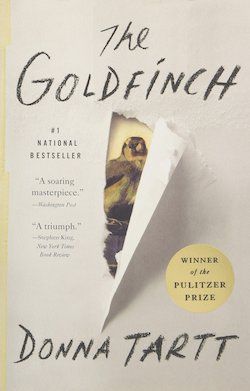
“The Goldfinch” by Donna Tartt
If you haven’t noticed yet, Donna Tartt’s “The Goldfinch” is a wild tour through almost every drug on the menu. She doesn’t linger and really show the full extent of each drug’s effects, but she does wax poetic for a few sentences on each one.
On the marble top of the dress I crushed one of my hoarded old-style Oxycontins, cut it and drew it into lines with my Christie’s card and—rolling the cripest bill in my wallet—leaned to the table, eyes damp with anticipation: ground zero, bam, bitter taste in the back of the throat and then the gust of relief, falling backward on the bed as the sweet old punch hit me square in the heart: pure pleasure, aching and bright, far from the tin-can clatter of misery.
19. Opium
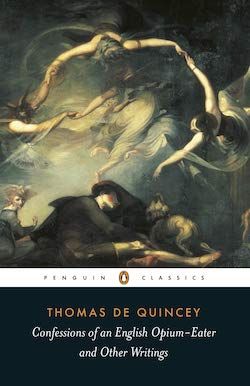
In “Confessions of an English Opium-Eater,” Thomas de Quincy extolls the virtues of opium. Though he initially took it for a toothache, he soons starts taking it regularly, praising its mental and therapeutic benefits.
Arrived at my lodgings, it may be supposed that I lost not a moment in taking the quantity prescribed. I was necessarily ignorant of the whole art and mystery of opium-taking, and what I took I took under every disadvantage. But I took it—and in an hour—oh, heavens! what a revulsion! what an upheaving, from its lowest depths, of inner spirit! what an apocalypse of the world within me! That my pains had vanished was now a trifle in my eyes: this negative effect was swallowed up in the immensity of those positive effects which had opened before me—in the abyss of divine enjoyment thus suddenly revealed. Here was a panacea, a φαρμακον for all human woes; here was the secret of happiness, about which philosophers had disputed for so many ages, at once discovered: happiness might now be bought for a penny, and carried in the waistcoat pocket; portable ecstacies might be had corked up in a pint bottle, and peace of mind could be sent down in gallons by the mail-coach.
20. Ayahuasca
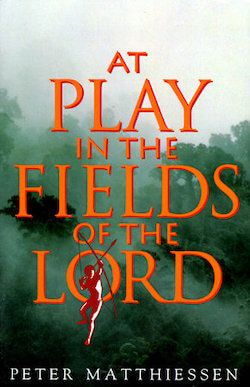
In Peter Matthieseen’s “At Play in the Fields of the Lord,” we see a character named Moon drugged up on Ayahuasca, which is a South American plant-based hallucinogenic.
Ayahuasca in especially popular in Peru, where it was used traditionally in shaman ceremonies and also therapeutically to treat trauma.
The hallucinogenic trip is a huge section, about ten pages, long, so I’ll only quote excerpts, starting with this one, which exaggerates his perceptions, shows him losing control of his body, and turns it into something surreal:
From over the man’s head the large white eyes of the moth observed him; they pinned him, like incoming beams. The music crashed, the wave … The door was dark again. He pushed himself to his feet and stared out of the window. The dark was rolling from the forest all around, and the sky was so wild as the sun set that it hurt his eyes. He reeled and fell, then thrashed to his feet and fell again, across the bed, and was sucked down into the darkness as the music burst the walls and overwhelmed him …
If he could only stop this laughing, but he could not; his laughter grew louder and louder, and when he tried to stop he could not close his mouth. It stretched wider and wider, until he swallowed the ceiling light, the room, the window and the night; the world rushed down into the cavernous void inside him, leaving him alone in space, pinwheeling wildly like a jagged fragment spun out from a planet.
For that last paragraph, I like how he uses hyperbole to exaggerate the laughter and the mouth, and takes it to a cosmic level – he’s now in space, freewheeling among the planets.
21. Amphetamines
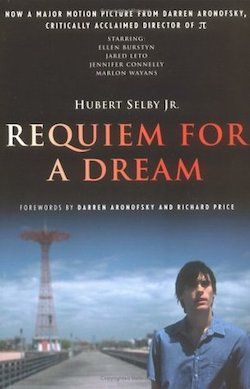
In Hubert Selby Junior’s “Requiem for a Dream” – yes, it was a book before it became a movie – most people think of the two younger characters addicted to heroin.
But the mother is also an addict in the book, an addict of prescribed drugs—amphetamines, which she dotingly calls the orange/yellow pills.
It wasnt yet three oclock and Sara was taking her orange evening pill and following it with a cup of coffee. She had watched the mailman walk up the street and he just nodded his head and went into the building. Sara followed, watched him put the mail in the boxes, stared at the emptiness of hers for many seconds before he left, then went into her apartment. She automatically made a pot of coffee then took her dinner time pill and sat at the kitchen table watching the new television her son Harry gave her. From time to time she looked at the clock. A little before three she was thinking it was almost dinner time. She took the orange pill and drank some more coffee. She made another pot. She sat. She thought. About the television. The show. About how she felt. Something was wrong. Her jaw hurt. Her mouth felt funny. She couldnt figure. It tasted like old socks. Dry. Sickening. Her stomach. O, her stomach. Such a mess. Like theres something moving. Like theres a voice in there saying lookout, LOOK OUT!!!! Theyll get you. She looked over her shoulder again. Nobody. Nothing. LOOK OUT! Who’s getting? Whats to get? The voice kept rumbling in her stomach. Before when it started she took more coffee or another pill and it went away, now its just there. All the time. And that nasty coating in her mouth, like old paste, it used to go away, or something. It didnt bother her. Now, ech. And all the time the trembles in the arms and legs. Everywhere. Little things under the skin. If she knew what show it would go away. Thats all she needed. To know. She finished her coffee and waited, trying to think those good feelings back into her body, her head …but nothing. Paste and old socks in the mouth. Squirming under the skin. The voice in the stomach. LOOK OUT! She stared at the television, enjoying the show, and all of a sudden, LOOK OUT!
- Here we have paranoia, with the “LOOK OUT!” being repeated again and again.
- We have physical ramifications, with her jaw, probably because she’s grinding her teeth.
- We also have a wonky sense of time—she keeps on expecting it to be later, and time seems to be going slower.
22. Amphetamines & Hashish
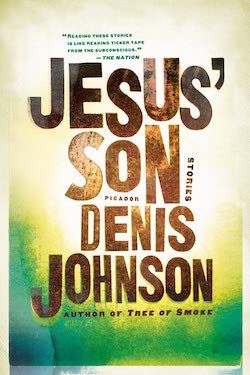
“Jesus’ Son” by Denis Johnson
“The traveling salesman had fed me pills that made the linings of my veins feel scraped out. My jaw ached. I knew every raindrop by its name. I sensed everything before it happened…
“Are you hearing unusual sounds or voices?” the doctor asked.
“Help us, oh God, it hurts,” the boxes of cotton screamed.
“Not exactly,” I said.
“Not exactly,” he said. “Now, what does that mean?”
“I’m not ready to go into all that,” I said. A yellow bird fluttered close to my face, and my muscles grabbed. Now I was flopping like a fish. When I squeezed shut my eyes, hot tears exploded from the sockets. When I opened them, I was on my stomach.
How did the room get so white?” I asked.
A beautiful nurse was touching my skin. “These are vitamins,” she said, and drove the needle in.
It was raining. Gigantic ferns leaned over us. The forest drifted down a hill. I could hear a creek rushing down among rocks. And you, you ridiculous people, you expect me to help you.
There’s a wonderful disconnect between what’s really happening and what he experiences.
- Tissues are talking
- He sees birds that aren’t there
- He flops to the ground
- He’s watching rain in a forest (though in a hospital)
And then he goes to a treatment center and gets drugs that straighten him out (probably methadone):
The drugs they’d injected me with had an amazing effect. I call it amazing because only hours before they’d wheeled me through corridors in which I hallucinated a soft, summery rain. In the hospital rooms on either side, objects—vases, ashtrays, beds—had looked wet and scary, hardly bothering to cover up their true meanings. They ran a few syringesful into me, and I felt like I’d turned from a light, Styrofoam thing into a person. I held up my hands before my eyes. The hands were as still as a sculptures.
Three observations
- He hallucinates rain inside.
- The objects are more than objects: they have hidden, deep meanings.
- He feels light and inconsequential, and his hands had been shaking.
23. Hashish
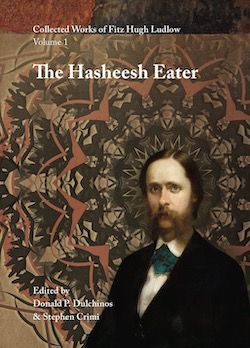
“The Hasheesh Eater” by Fitz Hugh Ludlow
Originally published in 1850, this is one of those classic texts of drug sensation literature. I could have quoted most of the book, to be honest, but just wanted to give you a few paragraphs that described his sensations of being on Hashish.
“I am borne aloft upon the glory of sound. I float in a trance among the burning choir of the seraphim. But, as I am melting through the purification of that sublime ecstasy into oneness with the Deity himself, one by one those pealing lyrics faint away, and as the last throb dies down along the measureless ether, visionless arms swiftly as lightning carry me far into the profound, and set me down before another portal. Its leaves, like the first, are of spotless marble, but ungemmed with wheeling eyes of burning color.”
“After the full storm of a vision of intense sublimity has blown past the hasheesh-eater, his next vision is generally of a quiet, relaxing, and recreating nature. He comes down from his clouds or up from his abyss into a middle ground of gentle shadow, where he may rest his eyes from the splendor of the seraphim or the flames of fiends. There is a wise philosophy in this arrangement, for otherwise the soul would soon burn out in the excess of its own oxygen. Many a time, it seems to me, has my own thus been saved from extinction.
24. Toad Venom (5-MeO-DMT)
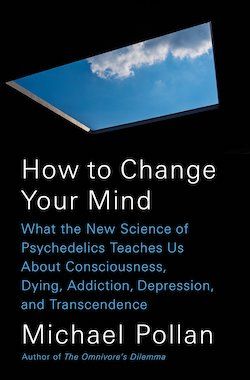
Michael Pollan. “How to Change Your Mind”
Of all the drugs on this page, this is probably the most rare. It’s the newest drug, and harder to get than most of the others on this page.
But it also gives the greatest high, a completely mind-altering journey that obliterates the other drugs and makes them seem as weak as caffeine.
Michael Pollan is a huge proponent of the therapeutic possibilities of psychedelics, and in the course of writing a few books on the topic, he went on many journeys, including taking toad venom.
I have no memory of ever having exhaled, or of being lowered onto the mattress and covered with a blanket. All at once I felt a tremendous rush of energy fill my head accompanied by a punishing roar. I managed, barely, to squeeze out the words I had prepared, “trust” and “surrender.” These words became my mantra, but they seemed utterly pathetic, wishful scraps of paper in the face of this category 5 mental storm. Terror seized me—and then like one of those flimsy wooden houses erected on Bikini Atoll to be blown up in the nuclear tests, “I” was no more, blasted to a confetti cloud by an explosive force I could no longer locate in my head, because it had exploded that too, expanding to become all that there was. Whatever this was, it was not a hallucination. A hallucination implies a reality and a point of reference and an entity to have it. None of those things remained.
Unfortunately, the terror didn’t disappear with the extinction of my “I.” Whatever allowed me to register this experience, the post-egoic awareness I’d first experienced on mushrooms, was now consumed in the flames of terror too. In fact every touchstone that tells us “I exist” was annihilated and yet I remained conscious. “Is this what death feels like? Could this be it?” That was the thought, though there was no longer a thinker to have it.
One by one, the elements of our universe begin to reconstitute themselves: the dimensions of time and space returned first, blessing my still-scattered confetti brain with the cozy coordinates of place; this is somewhere! And then I slipped back into my familiar “I” like an old pair of slippers and soon after felt something I recognized as my body began to reassemble. The film of reality was now running in reverse, as if all the leaves that the thermonuclear blast had blown off the great tree of being and scattered to the four winds were suddenly to find their way back, fly up into the welcoming limbs of reality, and reattach. The order of things was being restored, me notably included. I was alive!
25. Glue

“The Goldfinch” by Donna Tartt
The glue we sniffed came on with a dark, mechanical roar, like the windy rush of propellers: engines on! We fell back on the bed into darkness, like sky divers tumbling backwards out of a plane, although—that high, that far gone—you had to be careful with the bag over your face or else you were picking dried blogs of glue out of your hair and off the end of your nose when you came to. Exhausted sleep, spine to spine, in dirty sheets that smelled of cigarette ash and dog, Popchik belly-up and snoring, subliminal whispers in the air blowing from the wall vents if you listened hard enough.
26. Fictional Drugs
Spice (Fictional Psilocybin)
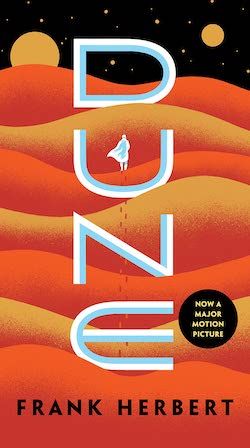
Frank Herbert, in “Dune,” created a drug called “Melange” or more colloquially, “spice” on the planet Arrakis.
When Jessica drank a drought made of this drug, this is how she reacted:
Whirling silence settled around Jessica. Every fiber of her body accepted the fact that something profound had happened to it. She felt that she was a conscious mote, smaller than any subatomic particle, yet capable of motion and of sensing her surroundings. Like an abrupt revelation—the curtains whipped away—she realized she had become aware of a psychokinesthetic extension of herself. She was the mote, yet not the mote.
Here we have traditional hallmarks of psychedelic trips:
- Attention to small details—a hyper-focus.
- Out of body experience, where one feels separate from your body/self
- A heightened sense of space and time
For Paul, the drug really opens up time:
Paul felt the drug beginning to have its unique effect on him, opening time like a flower…folding future and past into the present, leaving him the thinnest margin of trinocular focus…He held himself poised in the awareness, seeing time stretch out in its weird dimension, delicately balanced and yet whirling, narrow yet spread like a net gathering countless worlds and forces, a tightwire that he must walk, yet a teeter-totter on which he balanced… The drug had him again and he thought: So many times you’ve given me comfort and forgetfulness. He felt anew the hyperillumination with its high-relief imagery of time, sensed his future becoming memories—the tender indignities of physical love, the sharing and communion of selves, the softness and the violence.
27. Brute Root (fictional hallucinogenic)
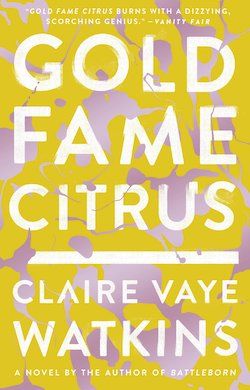
In Claire Vaye Watkins, “Gold, Fame, Citrus,” there is a made-up drug called brute root that a cult leader gives to his people, including the main character Luz.
Luz had chewed the whole sack of brute root and the flames were diamonds and triangles, arrows of light with pretty blue lozenges inside them. People spoke to her and she watched their faces go cubist, the features tectonic and akimbo. She walked. Bikes were sculpture in the new high country, thanks to impeding boulders and sandy sagebrush haystacks, and for a long time she stared at a pile of them, dancing. Jimmer’s teepee sprouted skyward like a beanstalk, and had she a little more energy she would have climbed it to heaven. She made a note to do that, if need be. Cody’s vans had little constellations of condensation in the corners of their windows, which were eyes wide open to all the alchemy in the world, which even Ray could not smash. She believed in something, would leap over the maybe-Sierras, smiling up at and down on her with their jack-o’-lantern teeth. She could feel ideas as they were conceived in her mind, shooting-star neuron kites with strings grazing her gray matter — a tingle breezing from one side of her skull to the other. She felt this epiphany — that ideas were physical and an attuned person could feel them — the way others felt a sneeze coming on.
Which was to say there were all different ways of listening. She heard her brain whispering to her eyes, convincing them anew of such concepts as color and light. She was very still for a very long time. She was inside her own heart, kneeling in a soupy chamber, going at the wall with a ball-peen hammer. She’d cracked a hole there, in the wall between the intellectual and the sensual, and so her thoughts were sensations. She tracked a tremor of relief as it surfed a deep layer of her dermis.
It’s interesting how often drug trips involve going inside of yourself, or going to space. Here we have shooting stars, much like the constellations and planets in other drug trips mentioned on this page.
28. Substance D (Fictional Psychoactive)
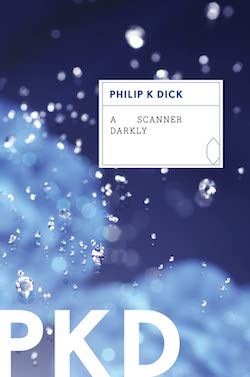
“A Scanner Darkly” Philip K. Dick
In this surreal sci-fi novel, Philip K Dick makes up a drug called Substance D.
Carrying his cigarette, he walked back to the bathroom, shut and locked the door, then, from inside the cigarette package, he got out ten tabs of death. Filling a Dixie cup with water, he dropped all ten tabs. He wished he had brought more tabs with him. Well, he thought, I can drop a few more when I get through work, when I get back home. Looking at his watch, he tried to compute how long that would be. His mind felt fuzzy; how the hell long will it be? he asked himself, wondering what had become of his time sense. Watching the holos has fucked it up, he realized. I can’t tell what time it is at all any more.
I feel like I’ve dropped acid and then gone through a car wash, he thought. Lots of titanic whirling soapy brushes coming at me; dragged along by a chain into tunnels of black foam. What a way to make a living, he thought, and unlocked the bathroom door to go back–reluctantly–to work.
29. Sobril (fictional)
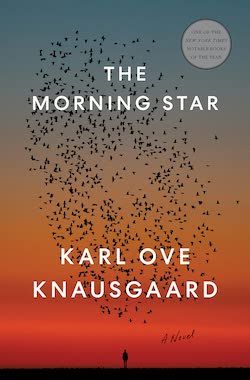
“The Morning Star” by Karl Ove Knausgaard
The pills wouldn’t kick in for another half-hour, I knew that, but it felt like they were already helping. A whispery sensation from the pills spiraled gently through my body, drawing a veil through the passages of my brain, settling softly on my nerves, calming and soothing. I felt so peaceful that even my most angry thoughts dissolved.
30. Moloko Plus (fictional hallucinogenic)
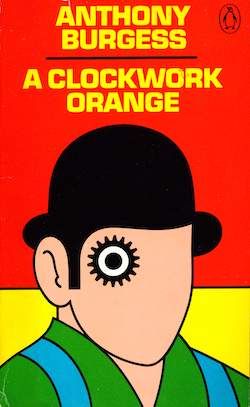
In “A Clockwork Orange” by Anthony Burgess, the main characters drink milk at a milkbar called “Moloko Plus,” only this milk is hardly for children! It’s laced with several different types of hallucinogens, and so right at the beginning of the book we see our characters getting loopy.
This heady mixture is also called “milk with knives in it.”
You’d lay there after you’d drunk the old moloko and then you got the messel that everything all round you was sort of in the past. You could viddy it all right, all of it, very clear – tables, the stereo, the lights, the sharps and the malchicks – but it was like some veshch that used to be there but was not there not no more. And you were sort of hypnotized by your boot or shoe or a finger-nail as it might be, and at the same time you were sort of picked up by the old scruff and shook like you might be a cat. You got shook and shook till there was nothing left. You lost your name and your body and your self and you just didn’t care, and you waited till your boot or your finger-nail got yellow, then yellower and yellower all the time. Then the lights started cracking like atomics and the boot or finger-nail or, as it might be, a bit of dirt on your trouser-bottom turned into a big big big mesto, bigger than the whole world, and you were just going to get introduced to old Bog or God when it was all over. You came back to here and now whimpering sort of, with your rot all squaring up for a boohoohoo. Now, that’s very nice but very cowardly. You were not put on this earth just to get in touch with God. That sort of thing could sap all the strength and the goodness out of a chelloveck.
Three observations about this trip:
- We have the hyper focus on small details (hypnotized).
- We also have loss of self (you lost your name and your body and your self.
- We have grandiose visions of the universe (going to meet God).
Withdrawals
Getting off drugs can be as much of an altered state of consciousness as being on them.
If you are writing a novel or book with characters taking drugs, you’ll probably need to write a withdrawal scene as well. Here are a few examples to give you a sense of the physical and mental state of coming down off drugs.

31. “The Goldfinch” by Donna Tartt
In “The Goldfinch,” the protagonist Paul attempts to go cold turkey and break the cycle of drug usage.
The chills came in ten minute spasms and then I was sweating. Runny nose, runny eyes, startling electrical twitches. The weather had turned, the shop was full of people, murmur and drift; the trees flowering on the streets outside were white pops of delirium. My hands were steady at the register, for the most part, but inside I was squirming. “Your first rodeo isn’t the bad one,” Mya had told me. “It’s around the third or fourth you’ll start wishing you were dead.” My stomach flopped and seethed like a fish on the hook; aches, jumpy muscles, I couldn’t lie still or get comfortable in bed and nights, after I closed the shop, I sat red-faced and sneezing in a tub that was hot almost beyond endurance, a glass of ginger ale and mostly melted ice pressed to my temple, while Popchik—too stiff and creaky to stand with his paws on the edge of the tub, as he had once liked to do—sat on the bath mat and watched me anxiously.

32. “Trainspotting” by Irvine Welsh
I don’t feel the sickness yet, but it’s in the post. That’s for sure. I’m in the junkie limbo at the moment. Too ill to sleep. Too tired to stay awake, but the sickness is on its way. Sweat, chills, nausea. Pain and craving. A need like nothing else I’ve ever known will soon take hold of me. It’s on its way.

33. “Will” by Will Self
No, it’s no longer an option for Will to take to his bed for two or three days and sweat it out … He’s already done this at least three times this year – four or five last. It’s dismaying: laying there in a foetid sopor, imaging the streets outside, their gutters running black with liquid misery – and when, after seventy-two hours, you feel some quickening, some rise in your spirits, it turns out only to be the puppet master, yanking your strings so that you stand, wobbling and sweaty – but ready to go once more unto the breach! and score.
Okay, I hope that helps guide you on your journey or writing characters on drugs, whether the drugs be real or fictional.
If you’re still looking for a hallucinogenic passage, I would also recommend page 14 – 16 of Sherman Alexie’s “The Lone Ranger and Tonto Fistfight in Heaven.”
If you do know of a passage where a character is experiencing the effects of a drug, please comment down below with the author and name of the book (huge bonus points if you actually include the passage!!!)
Happy writing!
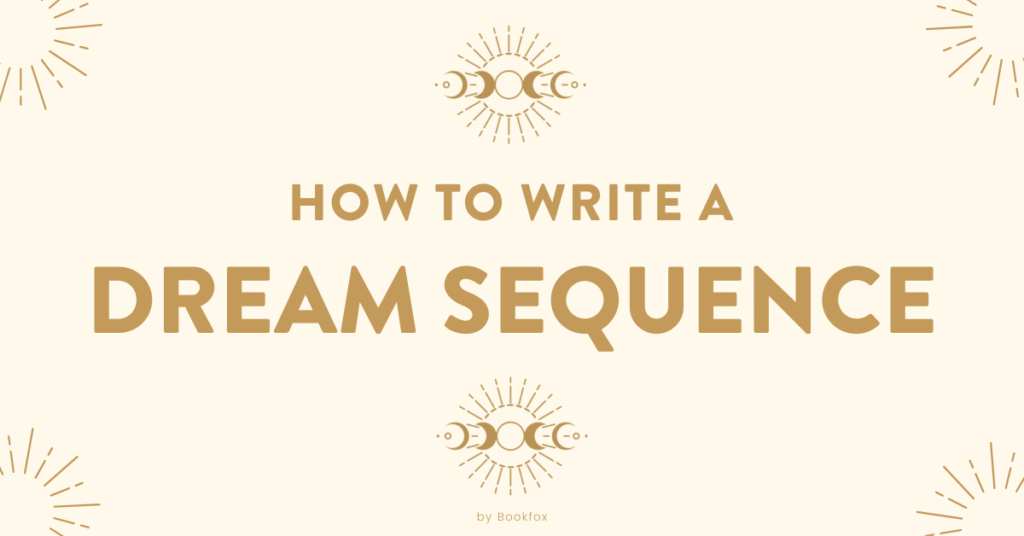
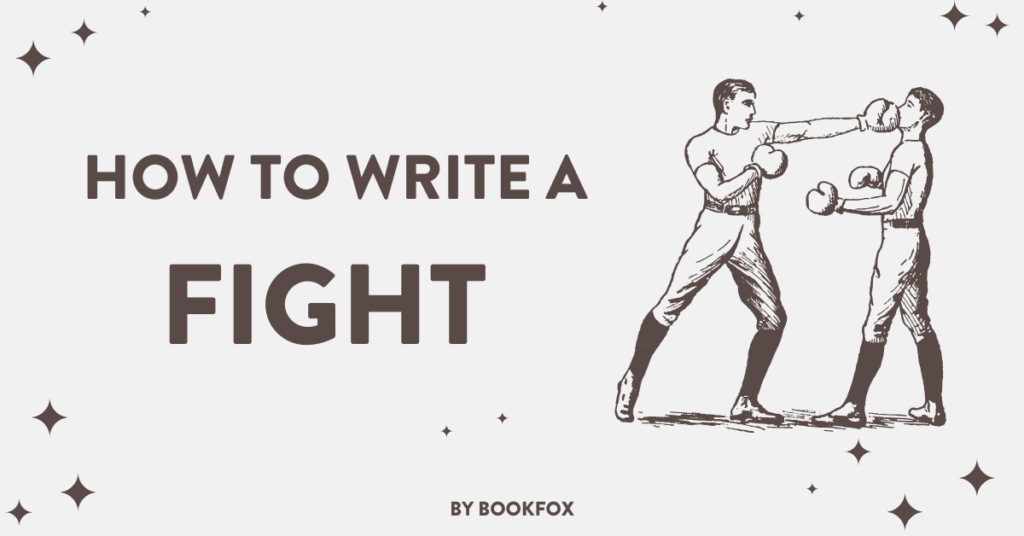

2 comments
This was really helpful. I appreciate all the effort made in making these lessons easy to grasp and relatable.
great
helped me in my book too